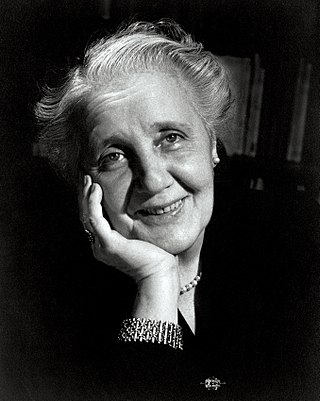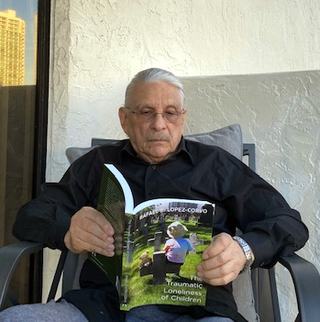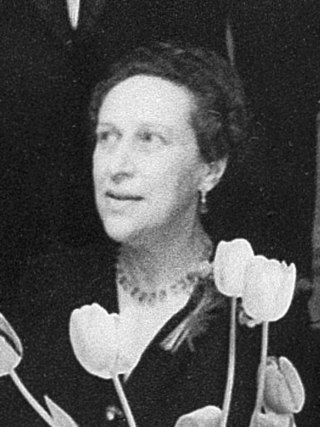
Wilfred Ruprecht Bion DSO was an influential English psychoanalyst, who became president of the British Psychoanalytical Society from 1962 to 1965.

Melanie Klein was an Austrian-British author and psychoanalyst known for her work in child analysis. She was the primary figure in the development of object relations theory. Klein suggested that pre-verbal existential anxiety in infancy catalyzed the formation of the unconscious, which resulted in the unconscious splitting of the world into good and bad idealizations. In her theory, how the child resolves that split depends on the constitution of the child and the character of nurturing the child experiences. The quality of resolution can inform the presence, absence, and/or type of distresses a person experiences later in life.
The British Psychoanalytical Society was founded by Ernest Jones as the London Psychoanalytical Society on 30 October 1913. It is one of two organisations in Britain training psychoanalysts, the other being the British Psychoanalytic Association.
Robert Douglas Hinshelwood is an English psychiatrist and academic. He is a Professor Emeritus of Psychoanalytic Studies at the University of Essex. He trained as a doctor and psychiatrist. He has taken an interest in the Therapeutic Community movement since 1974, and was founding editor of The International Journal of Therapeutic Communities, having edited, with Nick Manning, Therapeutic Communities: Reflections and Progress.
Donald Meltzer (1922–2004) was a Kleinian psychoanalyst whose teaching made him influential in many countries. He became known for making clinical headway with difficult childhood conditions such as autism, and also for his theoretical innovations and developments. His focus on the role of emotionality and aesthetics in promoting mental health has led to his being considered a key figure in the "post-Kleinian" movement associated with the psychoanalytic theory of thinking created by Wilfred Bion.

Rafael E. Lopez-Corvo is a Venezuelan-born medical doctor, psychiatrist and psychoanalyst. He is a former associate professor at Ottawa and McGill Universities and Program Director of Child and Adolescents Unite at the Douglas Hospital, McGill University in Montreal, Canada. He was also a member of the editorial board of the International Journal of Psycho-Analysis for Latin-America. Likewise, he is a training and supervising psychoanalyst for the International Psychoanalytic Association as well as the Canadian, Venezuelan and American Psychoanalytic Societies.
The Independent or Middle Group of British analysts represents one of the three distinct sub-schools of the British Psychoanalytical Society, and 'developed what is known as the British independent perspective, which argued that the primary motivation of the child is object-seeking rather than drive gratification'. The 'Independent group...is strongly associated with the concept of countertransference as well as with a seemingly pragmatic, anti-theoretical attitude to psychoanalysis'.
Hanna Segal was a British psychoanalyst of Polish descent and a follower of Melanie Klein. She was president of the British Psychoanalytical Society, vice-president of the International Psychoanalytical Association, and was appointed to the Freud Memorial Chair at University College, London (UCL) in 1987. The American psychoanalyst James Grotstein considered that "received wisdom suggests that she is the doyen of "classical" Kleinian thinking and technique." The BBC broadcaster Sue Lawley introduced her as "one of the most distinguished psychological theorists of our time,"
Elizabeth Spillius was a Canadian-English anthropologist, sociologist, and Kleinian psychoanalyst.

Paula Heimann was a German psychiatrist and psychoanalyst, who established the phenomenon of countertransference as an important tool of psychoanalytic treatment.
Edna O'Shaughnessy was a South African-born British Kleinian psychoanalyst.
Martin Grotjahn was a German-born American psychoanalyst who was known for his contributions to the field of psychoanalysis. He was the son of doctor Alfred Grotjahn and was born in Berlin, Germany.
Svein Haugsgjerd is a Norwegian psychiatrist and psychoanalyst. He is notable for using psychodynamic psychotherapy to treat patients with schizophrenia.
The New Center for Psychoanalysis is a psychoanalytic research, training, and educational organization that is affiliated with the American Psychoanalytic Association and the International Psychoanalytic Association. It was formed in 2005 from the merger of two older psychoanalytic organizations, the Los Angeles Psychoanalytic Society and Institute (LAPSI) and the Southern California Psychoanalytic Institute and Society (SCPIS), which had been founded as a single organization in the 1940s and then split around 1950.
Psychoanalytic institutes and societies in the United States are often linked together, though a distinction may be made between the functions of the institutes and the societies. Some local psychoanalytic organizations have both words in their title while others have only one or the other.
James S. Grotstein was a psychiatrist and psychoanalyst, known for his role in the popularization and explication of the work of Melanie Klein and Wilfred Bion. Among other topics, he expanded on Klein's notions of the paranoid-schizoid and depressive positions. His roles in psychoanalytic organizations included serving as North American Vice President of the International Psychoanalytical Association (IPA), and on the editorial board of the International Journal of Psychoanalysis (IJP).
James Gooch was an American psychiatrist and psychoanalyst influential in promoting the ideas of Melanie Klein, Wilfred Bion, and the British Object Relations theorists in Southern California in the 1980s and 1990s. He was chair of the Department of Psychoanalysis at the California Graduate Institute, an independent professional school for psychologists, and during 1984-1990 he was founding president of the Psychoanalytic Center of California (PCC), a Kleinian-oriented psychoanalytic institute in Los Angeles. He was also a founding member of The Confederation of Independent Psychoanalytic Societies and served for eight years as the North American Representative to the Board of the IPA International Psychoanalytic Association.
Elizabeth Rosenberg Zetzel (1907-1970) was an American psychoanalyst and physician.
Irma Brenman Pick is a South African-born British psychologist and psychoanalyst known for her work on countertransference. She served as the president of the British Psychoanalytical Society from 1997 to 2000.

Elisabeth Rozetta Geleerd Loewenstein was a Dutch-American psychoanalyst. Born to an upper-middle-class family in Rotterdam, Geleerd studied psychoanalysis in Vienna, then London, under Anna Freud. Building a career in the United States, she became one of the nation's major practitioners in child and adolescent psychoanalysis throughout the mid-20th century. Geleerd specialized in the psychoanalysis of psychosis, including schizophrenia, and was an influential writer on psychoanalysis in childhood schizophrenia. She was one of the first writers to consider the concept of borderline personality disorder in childhood.





